初中英语现在完成时(20200613090848)
初三英语《现在完成时》PPT课件

What has happened to the USA in the last 350 years?
注意点一: 现在完成时与一般过去时的用法比较 现在完成时表示过去的动作一直延续到现在甚至会继续下去或表示 过去的动作对现在造成的影响;一般过去时表示动作发生的时间在 过去。现在完成时属于现在时态范围,因此,不能和表示过去的时 间状语连用。 如:yesterday, last night, two weeks ago等 试比较: The plane has arrived . 飞机已经来了。(说明现在的情况:飞机 在这儿) The plane arrived a quarter ago. 飞机是一刻中以前来的。(强 调动作发生的时间在过去) I have taught here for fifteen years. 我在这儿已经教了十五年。 (表示十五年前的动作一直延续到现在,还可能会继续。) I taught here for a year. 我过去在这儿教过一年。(表示“我“现 在已经不在这儿任教了)
((√×))
He has joined the League member for two years. ( ×)
√ He has been a League member for two years. ( )
他已入团两年了。
The man has been dead for several years. The man has died for several years. 这个人已经死了几年了。
练习:用have(has) been 或have(has) gone 填空 A: Where __1__ Li Fei __1__? B: He __2__ to Hainan Island. A: How long __3__ he __3___ there? B: He ___4__ there for three days. A: When will he come back , do you know? B: I’m afraid he won’t come back recently. A: Could you tell me the way to Hainan Island? B: Sorry, I __5__ never __5__ there. A: How many times __6__ Li Fei __6___ to that place? B: He __7__ there only once.
初中英语现在完成时详解

如今完成时【1 】一.如今完成时组成组成:如今完成时由助动词have + 曩昔分词组成,助动词have 有人称和数的变更.第三人称单数用has,其余用have.如今完成时的否认式直接在助动词后面加上not.疑问式是把助动词提到主语之前.以study 为例,其否认式.疑问式和简略答复情势如下:1.如今完成时平日暗示在措辞之前已经完成的动作或消失的状况.措辞人强调的是该动作或状况对如今的成果或影响.My daughter has just gone out. 我女儿刚出去.I’m sure we’ve met before. 我肯定我们以前见过面.She has arrived. 她到了.2.暗示中断到如今的动作或状况,往往和包含如今在内的暗示一段时光的状语连用,如recently, already, just, lately, for…, since…,yet等.如:I haven’t heard from her these days. 这些日子我没有收到她的信.We haven’t seen you recently. 比来我们没有见到你.They have been away for two years. 他们分开已经两年了.She has been with us since Monday.①for+时段②since+曩昔一个时光点(译为:自从……以来)③since+时段+ago④since+从句(曩昔时)⑤It is+时段+since+从句(曩昔时)Mary has been ill for three days.I have lived here since 1998.留意:since和for的差别since后接时光点,如1993,last term, yesterday, the time I got therefor后接一段时光,暗示“长达多久”,如ten years, a while, two days等.3.暗示短暂意义的动词如arrive, leave, borrow, buy, begin, start, die等,在完成时当中不克不及和暗示一段时光的状语连用,因为它们暗示的动作不成能中断.是以,不克不及说:He has come here for 2 weeks. ×The old man has died for 4 months. ×They have left only for 5 minutes. ×4.has gone (to),has been (to), has been (in) 的差别Have/Has gone(to) :去了(如今不在措辞现场,可能在路上和已经到)Where is your father?He has gone to Shanghai.Have/Has been (to) :去过(已不在去过的地方)My father has been to Shanghai.Have/has been in:呆了多久(还在所呆的地方)My father has been in Shanghai for two months. /since two months ago.5.如今完成时不克不及和暗示曩昔的时光状语连用,如yesterday, last year, in 1976, two days ago, just now, when I came in,但可以和already, yet, sometimes, always, often, before, lately, recently, once, twice, ever, never等连用.不克不及与when连用.如今完成时往往同暗示不肯定的曩昔时光状语连用例如:She has already come. 她已经来了.I haven’t read it yet. 我还没读过这个.I have met him before. 我从前曾见过他.Ma Hong has always been a good student. 马红一向是个勤学生.I have often seen him in the street. 我经常在街上看见他.They have never been to Yan’an. 他们从未去过延安.I haven't seen him lately. 我比来没看到他.三.如今完成时的标记1.如今完成时的寄义之一是曩昔完成的动尴尬刁难如今仍有影响,用以下四大标记词可以表达这种寄义:* 以already, just和yet为标记He has already got her help.他已得到她的帮忙.He has just seen the film.他方才看过这场片子.He hasn't come back yet.他还没有回来.* 以ever和never为标记This is the best film I have ever seen.这是我曾看过的最好的一部片子.He has never been to Beijing.他从没有到过北京.* 以动作产生的次数为标记He says he has been to the USA three times. 他说他已经去过美国三次了.* 以so far(到今朝为止)为标+beforeHe has got to Beijing so far.到今朝为止他已到了北京.She has passed the exam so far.到今朝为止她已经经由过程了测验.2.曩昔已经开端的动作一向延续到如今, 甚至有可能中断延续下去,我们可以从动作“延续”的特征和“时光”点段的区分入手,进一步进修如今完成时.①for+时段②since+曩昔一个时光点(曩昔从句)为标记四. 刹时动词buy, die, join, come,go ,leave, join ……不克不及直接与for since 连用.要转变动词buy----have borrow -----keepcome/arrive/reach/get to-----be ingo out----be out leave ----be awaybegin-----be on finish----be overopen----be open close -----be closeddie----be dead1.have代替buyMy brother has had(不克不及用has bought) this bike for almost four years.2.用keep或have代替borrowI have kept(不克不及用have borrowed) the book for quite a few days.3.用be替代becomeHow long has your sister been a teacher?4.用have a cold代替catch a coldTom has had a cold since the day before yesterday.5.用wear代替put on6.用“be+形容词”代终止性动词be+married代marry be+ill代fall (get) illbe+dead代die be+asleep代fall (get) asleepbe+awake代wake/wake up be+gone代lose,die,sell,leavebe+open代open be closed代close/shutbe+missing(gone,lost)代lose7.用“be+副词”代终止性动词be+on代startbegin“be+up”代get up“be+back(to)”代return to, come back to, go back to“be here (there)”代come(arrive, reach, get) here或go (arrive, reach, get) there8.用“be+介词短语”代终止性动词1.“be in/at +地点”代替go to /come to2.用be in the army 代替join the army3.“be in/at +地点”代替move to经常应用刹时动词变延续性动词表:1. have arrived at/in sw. got to/reached sw. come/gone/moved to sw.→have been in sw./at…响应的介词2. have come/gone back/returned → have been back3. have come/gone out →have been out4. have become → have been5. have closed / opened→ have been close/open6. have got up → have been up;7. have died → have been dead;8. have left sw. → have been away fro m sw.9. have fallen asleep/got to sleep → have been asleep;10. have finished/ended/completed → have been over;11. have married → have been married;12. have started/begun to do sth. → have done sth. ;13. have begun → have been on14. have borrowed/bought →have kept/had15. have lost → haven’t had16. have put on →have worn17. have caught /get a cold → have had a cold;18. have got to know → have known19. have/has gone to → have been in20. have joined/have taken part in the league/the Par ty/the army→have been a member of/ have been in/have been the Party’s member/the league member/the soldier…。
初中英语现在完成时课件(共62张PPT)

speak-spoke-spoken
freeze-froze-frozen
ride-rode-ridden
get-got-gotten (got) forget-forgot-forgotten (forgot) 特殊:
am/is-was-been are-were-been,
do (does)-did-done go-went-gone
I have already done my homework. 否定句: I haven’t done my homework yet. 一般疑问句: Have you done your homework yet?
3. ever在现在完成时中的用法
肯定句/疑问句 : 句中 “曾经” I’ve ever been to Beijing. Have you ever been to Beijing?
catch,teach
ABB(含规则动词)
1.另有一些其它形式的变化。
have (has)-had-had lose-lost-lost feel-felt-felt stand-stood-stood
leave-left-left make-made-made spell-spelt-spelt
ABA
有些动词的过去分词与原形是一样的:
run-ran-run come-came-come become-became-become overcome-overcame-overcome
ABB(含规则动词)
原型 过去式 过去分词
例词
-eep -ept -ept
keep,sweep,sleep
-ell -old -old
加-ed 结尾是“辅音字母+y”
英语知识点:现在完成时(Present Perfect Tense)

英语知识点:现在完成时(Present Perfect Tense)
3. 主谓一致 主语为第三人称单数时,助动词用has;其他情况用have。 六、练习题 1) 填空: a) She __________ (finish) her work already. b) They __________ (not see) this movie yet. c) __________ you ever __________ (be) to New York? d) He __________ just __________ (leave).
英语知识点:现在完成时(PreБайду номын сангаасent Perfect Tense)
3. 表示经历或经验 - 用于描述某人曾经有过的经历或经验。 - 例句:She has traveled to many countries.(她去过很多国家。) 4. 表示刚刚完成的动作 - 通常与just连用,表示刚刚发生或完成的动作。 - 例句:He has just finished his dinner.(他刚吃完晚饭。)
英语知识点:现在完成时(Present Perfect Tense)
五、注意事项 1. 区别一般过去时 一般过去时强调动作发生在具体的过去时间,而现在完成时强调对现在的影响或从过去持 续到现在。 示例: I went to the store yesterday.(一般过去时) vs.I have gone to the store.(现在完 成时) 2. 不可与具体的过去时间状语连用 如yesterday, last week等不能与现在完成时连用,但可以与不具体的时间状语连用,如 ever, never, before等。
英语知识点:现在完成时(Present Perfect Tense)
八年级英语现在完成时知识点
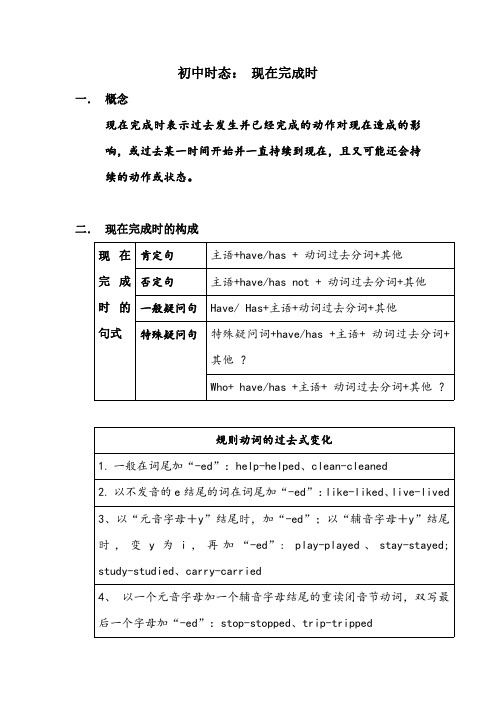
初中时态:现在完成时一.概念现在完成时表示过去发生并已经完成的动作对现在造成的影响,或过去某一时间开始并一直持续到现在,且又可能还会持续的动作或状态。
二.现在完成时的构成现在完成时的句式肯定句主语+have/has+动词过去分词+其他否定句主语+have/has not+动词过去分词+其他一般疑问句Have/Has+主语+动词过去分词+其他特殊疑问句特殊疑问词+have/has+主语+动词过去分词+其他?Who+have/has+主语+动词过去分词+其他?规则动词的过去式变化1.一般在词尾加“-ed”:help-helped、clean-cleaned2.以不发音的e结尾的词在词尾加“-ed”:like-liked、live-lived3、以“元音字母+y”结尾时,加“-ed”;以“辅音字母+y”结尾时,变y为i,再加“-ed”:play-played、stay-stayed; study-studied、carry-carried4、以一个元音字母加一个辅音字母结尾的重读闭音节动词,双写最后一个字母加“-ed”:stop-stopped、trip-tripped三.现在完成时的用法1.表示过去发生并已经完成的动作对现在造成的影响:I have heard of the man.2.过去某一时间开始并一直持续到现在,且又可能还会持续的动作或状态:I have lived in this city since I was born.四.常与一般现在时连用的时间状语already,yet(常用于否定句和疑问句中表示“仍,还”),before, recently,never,ever,once,twice等。
I have already finished my homework.固定的短语:for+一段时间,since+过去时间点+ago,so far, up to now,in the past/last three yearsI have been here since two months ago.五.难点拓展1.since和for的区别since用来说明动作的起始时间,for用来说明动作延续的时间长度。
初中英语现在完成时课件

现在完成时的特殊情况
1
句中带有提问词
当句中有提问词时,将提问词与现在完成时连用。
2
延续性动词
某些延续性动词不能和现在完成时连用,需要使用进行时。
3
有限时间
表示在有限的时间内完成或未完成某个动作。
现在完成时的练习与应用
口语练习
与同学交流你最近的学习经历 和过去的旅行经历。
语法练习
完成一些与现在完成时相关的 语法练习题。
写作应用
用现在完成时写一篇关于你自 己生活的日记。; have/has + 动词的过去分词
否定句
主语 + have/has + not + 动词的过去分词
疑问句
Have/Has + 主语 + 动词的过去分词 + 其他?
现在完成时与过去时的区别
1 时间表达
现在完成时强调与现在的关联,过去时强调与过去的关联。
2 时间段
现在完成时可以涵盖过去到现在的时间段,而过去时只涵盖过去的时间段。
初中英语现在完成时课件
本课件将帮助你全面了解初中英语现在完成时的定义、构成、用法,以及它 与过去时的区别。你将学习常见的时间状语和掌握现在完成时的特殊情况。 通过丰富的练习与应用,你将轻松掌握现在完成时。让我们开始吧!
现在完成时的定义
现在完成时表示过去发生的动作对现在产生的影响或结果。它由助动词 "have/has"和动词的过去分词构成。
3 经验和经历
现在完成时侧重于经验和经历,而过去时侧重于过去的事件和动作。
现在完成时的用法
完成的动作对现在 的影响
表达过去完成的动作对现在 产生的结果或影响。
经验和经历
现在完成时知识点详解初中
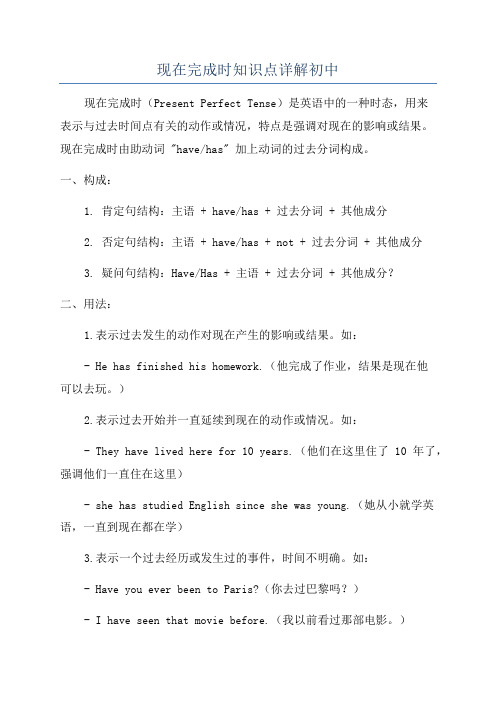
现在完成时知识点详解初中现在完成时(Present Perfect Tense)是英语中的一种时态,用来表示与过去时间点有关的动作或情况,特点是强调对现在的影响或结果。
现在完成时由助动词 "have/has" 加上动词的过去分词构成。
一、构成:1. 肯定句结构:主语 + have/has + 过去分词 + 其他成分2. 否定句结构:主语 + have/has + not + 过去分词 + 其他成分3. 疑问句结构:Have/Has + 主语 + 过去分词 + 其他成分?二、用法:1.表示过去发生的动作对现在产生的影响或结果。
如:- He has finished his homework.(他完成了作业,结果是现在他可以去玩。
)2.表示过去开始并一直延续到现在的动作或情况。
如:- They have lived here for 10 years.(他们在这里住了10年了,强调他们一直住在这里)- she has studied English since she was young.(她从小就学英语,一直到现在都在学)3.表示一个过去经历或发生过的事件,时间不明确。
如:- Have you ever been to Paris?(你去过巴黎吗?)- I have seen that movie before.(我以前看过那部电影。
)4.表示以前曾经做过的经历或动作。
如:- Have you ever tried sushi?(你试过寿司吗?)三、注意事项:1. 标志词:already(已经)、yet(还),常与现在完成时连用。
2.与一般过去时的区别:4. 主要使用have的情况:- 我们一般用have作为第一人称(I、we)和第二人称(you)的助动词,用has作为第三人称(he、she、it)的助动词。
如:- I have seen the movie.- He has read the book.- 固定搭配中使用have:- have breakfast/lunch/dinner(吃早饭/午饭/晚饭)- have a shower/bath(洗澡)- have a look(看一看)- have a rest(休息)。
初中语法——现在完成时-课件(共75张PPT)

(1)、一般动词,在词尾直接加“ ed ”。 work---worked---worked visit---visited---visited
(2)、以“ e ”结尾的动词,只在词尾加 “ d ”。
live---lived
(3)、以“辅音字母 + y ”结尾的动词,将 “y” 变为 “i”,
3.The film has been on __f_o_r__ 20 minutes. 4.Mr Green has worked here _s_in_c_e__ he came to China.
5.His grandpa has been dead __fo__r __ several years.
肯定句: “己经”
I’ve already had breakfast. (常见) = I’ve had breakfast already.
一般疑问句: 句末(表示惊讶的语气) “难道”
Have you had breakfast already? (表示强调)
(2) yet
否定句:句末 “还(没)” I haven’t had breakfast yet.
You have planted all the trees. I have planted all the trees. He/she has planted all the trees. They have planted all the trees.
主语若是第三人称单数助动词用 has
过去分词
12. Tom has worn glasses _s_i_n_ce___he was 7 years old.
borrow arrive/come
初中英语现在完成时讲解全 ppt课件

初中英语现在完成时讲解全
16
• 2 标准词:so far/up to now (到目前为止) ;lately/recently(最近)
• Up to now/So far ,I haven’t been successful. • Lately/Recently,I haven’t seen my teacher.
初中英语现在完成时讲解全
7
初中英语现在完成时讲解全
8
初中英语现在完成时讲解全
9
初中英语现在完成时讲解全
10
初中英语现在完成时讲解全
11
初中英语现在完解全
13
•2.一个动作从过去开始持续到现在,并有可能继续持续 下去。
•过去时:动作过去已经结束。
•He has taught in our school for five years. •I have worked since last week.
2.他借这本书两个月了borrow He has borrow the book. (1)He has kept the book for 2 months . (2) He has kept the book since 2 months ago.
3.李梅离开济南一年了 .leave LiMei has left Jinan (1) Li Mei has been away from Jinan for one year. (2) Li Mei has been away from Jinan since 1 year ago.
现在完成时
初中英语现在完成时讲解全
1
•现在完成时的含义 •1.表示动作发生在过去,对现在造成的影响。
初中英语现在完成时讲解全
(完整)初中英语现在完成时.docx

Present perfect tense现在完成时Objectives1.学在完成;2.在完成与一般去的区及用法。
Grammar一、在完成的定:1.表示去生或已完成的作在造成的影响或果。
2.也可以表示去已开始,一直延到在的作或状二、在完成的构have/has+ done (去分)注意:表示短作的,如:come , go, die , marry , buy 等的完成不能与for ,since 等表示一段的用。
用来持的作或状或表去重复的作,如live , study , be , wait 等,常和 since (自从)或for ()引的用。
如: I have lived here for more than thirty years.我已在此住了30 多年。
三、在完成的状1.ever, never, twice(once⋯), so far(到目前止), , already (肯定句) , yet (否定,疑句) , just(), before(以前), recently(近来)等用2.Since+ 点, for+ 段,in the past/last few years表示短作的,如:come ,go, die , marry , buy 等的完成不能与for , since 等表示一段的用。
用来持的作或状或表去重复的作,如live ,study , be , wait 等,常和since (自从)或for ()引的用。
明: already与yet都有“已”的意思,但already常用于肯定句,并用于句中。
yet 常用于否定句和疑句,并用于句末。
例如:I have already finished my homework.I haven’ t finished my homework yet. Have you finished your homework yet?They have left. (他们已经离开了,也就是说现在他们人不在这里)I have had my lunch. (我已经吃过午饭了, 也就是说我现在不饿)I can’ t find my watch now. I think I have already lost it.注意: 1)现在完成时不能单独与过去的时间状语连用, 如 yesterday, last week, three years ago等;2)不能与 when 连用四、现在完成时的用法A .表示过去发生或已经完成的动作对现在造成的影响或结果,强调对现在造成的影想或结果)。
初中英语知识点现在完成时

初中英语知识点现在完成时:现在完成时表示过去发生的动作或状态对现在造成的影响或结果,常与时间状语“已经”、“曾经”、“从来没有”等连用。
构成:主语+ have/has + 过去分词例如:- I have finished my homework.(我已经完成了我的作业。
)- She has never been to Beijing.(她从来没有去过北京。
)注意事项:1. have/has的用法have用于第一人称(I/we/you/they),has用于第三人称单数(he/she/it)。
2. 过去分词的构成动词原形+ ed,不规则动词需记忆。
3. 时间状语的使用现在完成时常与时间状语连用,如already(已经)、never(从未)、ever(曾经)、just(刚刚)、yet(还)等。
练习题:1. —Have you ever been to New York City?—Yes, I ________ there last year.A. wentB. have goneC. have beenD. go2. I ________ my keys. Can you help me find them?A. lostB. loseC. am losingD. have lost3. He ________ his homework yet.A. didn't finishB. hasn't finishedC. isn't finishingD. doesn't finish4. —How long ________ you ________ here?—For about two hours.A. have, beenB. did, stayC. will, beD. had, left5. I ________ my bike for three years.A. haveB. hadC. hasD. am having答案:1. C2. D3. B4. A5. A。
(完整word版)初中英语语法——现在完成时.pdf

初中英语语法——现在完成时现在完成时表示目前为止已经完成的动作或存在的状态。
现在完成时时一种发生于过去,着眼于现在的时态;动作发生在过去,而强调点落在对现在的影响上,或描述从过去一直持续到现在的动作或状态。
1.现在完成时谓语动词的结构形式(1)现在完成时谓语动词的结构形式:助动词have/has+过去分词。
has用于主语为第三人称单数的句子中国,其他各人称用have。
如:I have lived Wuhan for years.She has finished her homework already.(2)现在完成时一般疑问句、否定句、特殊疑问句结构及一般疑问句的答语:*一般疑问句为:将have/has在句子开头,且首字母要大写,句末用问号。
*肯定回答为:Yes,+主语的相应代词+have或has;;*否定回答为:No,+主语的相应代词+haven't或hasn’t*否定句为:在have,has后加not+过去分词。
Have和has可以和not缩写为haven't,hasn't。
*特殊疑问句为:特殊疑问词+have/has+主语+过去分词+......?如:—Have you read the article in today's newspaper?(一般疑问句)(肯定、否定回答)—Yes,I have./No,I haven’t.—Have your mother finish cooking ?(一般疑问句)—Yes,she has./No,she hasn’t.(肯定、否定回答)(否定句)They haven’t written to their parents.Where have you been all this afternoon?(特殊疑问句)2.现在完成时的用法(1)现在完成时表示目前为止已经完成的动作,常与just,already,yet,ever,never,recently,before,twice,three times等时间状语连用。
初中英语语法——现在完成时知识点总结归纳
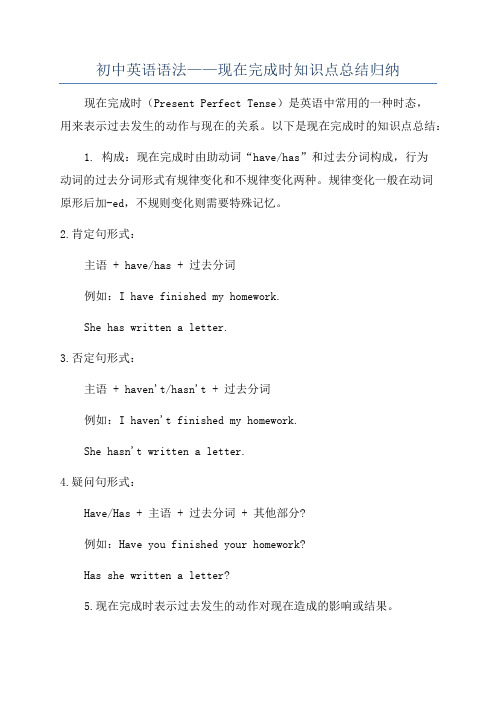
初中英语语法——现在完成时知识点总结归纳现在完成时(Present Perfect Tense)是英语中常用的一种时态,用来表示过去发生的动作与现在的关系。
以下是现在完成时的知识点总结:1. 构成:现在完成时由助动词“have/has”和过去分词构成,行为动词的过去分词形式有规律变化和不规律变化两种。
规律变化一般在动词原形后加-ed,不规则变化则需要特殊记忆。
2.肯定句形式:主语 + have/has + 过去分词例如:I have finished my homework.She has written a letter.3.否定句形式:主语 + haven't/hasn't + 过去分词例如:I haven't finished my homework.She hasn't written a letter.4.疑问句形式:Have/Has + 主语 + 过去分词 + 其他部分?例如:Have you finished your homework?Has she written a letter?5.现在完成时表示过去发生的动作对现在造成的影响或结果。
例如:I have lost my key.(我丢失了我的钥匙,现在找不到了。
)He has broken his leg.(他折断了腿,现在不能走路。
)6.现在完成时还可以用来表示一直延续到现在的动作或状态。
例如:I have lived in this city for five years.(我已经在这个城市住了五年了。
)She has known him since high school.(她从高中就认识他了。
)7.现在完成时与时间状语的连用:现在完成时通常与以下时间状语连用:just(刚刚)、already(已经)、yet(还)、ever(曾经)、never(从未)、recently(最近)、since(自从)、for(持续时间)例如:I have just finished my homework.(我刚完成了作业。
初中英语现在完成时知识点总结
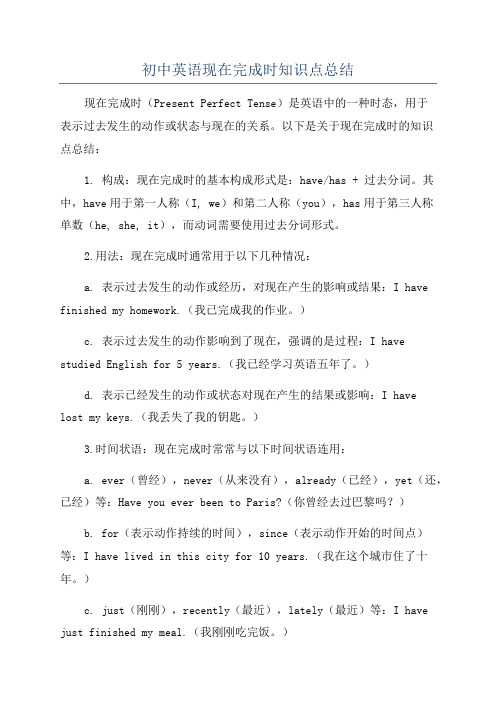
初中英语现在完成时知识点总结现在完成时(Present Perfect Tense)是英语中的一种时态,用于表示过去发生的动作或状态与现在的关系。
以下是关于现在完成时的知识点总结:1. 构成:现在完成时的基本构成形式是:have/has + 过去分词。
其中,have用于第一人称(I, we)和第二人称(you),has用于第三人称单数(he, she, it),而动词需要使用过去分词形式。
2.用法:现在完成时通常用于以下几种情况:a. 表示过去发生的动作或经历,对现在产生的影响或结果:I have finished my homework.(我已完成我的作业。
)c. 表示过去发生的动作影响到了现在,强调的是过程:I have studied English for 5 years.(我已经学习英语五年了。
)d. 表示已经发生的动作或状态对现在产生的结果或影响:I havelost my keys.(我丢失了我的钥匙。
)3.时间状语:现在完成时常常与以下时间状语连用:a. ever(曾经),never(从来没有),already(已经),yet(还,已经)等:Have you ever been to Paris?(你曾经去过巴黎吗?)b. for(表示动作持续的时间),since(表示动作开始的时间点)等:I have lived in this city for 10 years.(我在这个城市住了十年。
)c. just(刚刚),recently(最近),lately(最近)等:I have just finished my meal.(我刚刚吃完饭。
)d. so far(到目前为止),up to now(到现在为止),since then (从那时起)等:He has been to many countries so far.(他到目前为止去过很多国家。
)4.注意事项:b. 如果句子中有明显的表示过去的时间状语,应使用过去式而不是现在完成时。
九年级英语语法知识—现在完成时全国通用知识精讲

九年级英语语法知识—现在完成时全国通用【本讲主要内容】语法知识——现在完成时【知识总结归纳】一. 现在完成时的时间状语现在完成时的时间状语(包括副词、短语、从句等)主要有三种类型,分别用于不同意义的句子之中。
1. 表达“现在刚刚完成”的动作:副词:just, already, yet, recently(lately, etc)短语:so far, these +(最近)一段时间,etc2. 表达某种经历或经验副词:ever, never, once, twice, before, etc常用句:How many times…?3. 表达“过去继续到现在的动作或状态”,常与for和since连用,如:for two weeks, for a long timesince + 过去时间点/ n. / 一段时间+ ago / 一般过去时的从句在以上的时间状语中需要认真区别的就是“since + 一段时间+ ago”这个结构,它与“一段时间+ ago”含义不同,前者为时间段,后者为时间点。
二. 一般过去时与现在完成时的比较1. 在表达“过去的经历、经验”的概念时,如果时间不确定,用现在完成时,如果时间确定,则用一般过去时。
eg.I’ve met him before.I met him two days ago.2. 在when或what time引导的特殊疑问句中,不能用现在完成时。
eg.When have you visited New York?When did you visit New York?3. 过去发生的连串动作,如用and, but, or, so等对等连词连接,要用一般过去时。
三. 延续性动词与瞬间动词[例1] Mr. Green for two hours.A. has goneB. has leftC. has arrivedD. has been away[例2] I for six months.A. have received John’s letterB. have heard from JohnC. haven’t heard from JohnD. haven’t heard from John’s letter以上两题都涉及了延续性动词与非延续性动词,即瞬间动词,所谓延续性动词,又称为持续性动词,即可以表示持久动作或状态的动词,如drink, eat, read, play, fly, talk等词,这些动词有以下特点:(1)可以和表示时间段的状语连用The students have played for an hour.Mr. Green has read for about four hours.He will stay there for two weeks.(2)可以用于进行时态I am writing an important letter.It was raining hard when we got off the rain.瞬间动词,也叫终止性动词,暂时性动词或“点动词”,如open / close, leave, e, go, put, arrive, finish, borrow, lend, marry 等动作在极短的瞬间时间内完成的,也就是说该动作一发生即直接转入结束,结果状态,这类词有以下特点:(1)不能和表示一段时间的时间状语连用,试看以下例句:① 我感冒一个星期了。
初中英语语法课件 现在完成时

疑问句:Have / Has+主语+过去分词...?
Have you finished your homework? 你完成作业了没?
现在完成时的用法
表示到现在为止已经完成或刚刚完成的动作。 Now we have planted all the trees. 截止目前,我们种完了所有的树。 He has just come back. 他已经回来了。 They have built many buildings in this city. 他们在这个城市建成了好多建筑物。
重读闭音节结尾,末尾只有一个辅音字母,先双写该辅音字母,再加“ ed ”。 drop---dropped--dropped
过去分词的变化(不规则)
A.过去分词与不规则动词的过去式形式一样 have—had—had spend —spent—spent make—made—made say—said—said find—found—found hear—heard—heard meet—met—met leave—left—left fly—flied—flied
过去分词的变化(不规则)
B.过去分词与过去式形式不一样 take—took—taken see — saw — seen speak —spoke—spoken sing—sang—sung drive—drove—driven be—was/were—been go—went—gone
过去分词的变化(不规则)
现在完成时
现在完成时定义
现在完成时定义三要素: 表示到现在为止已经完成或刚刚完成的动作。 一件发生在过去的事情对现在产生影响。 一个动作开始于过去,并持续到现在(也许还将持续下去)。 We have known each other since 2005. 我们从2005年认识的。 I have lived in Wuhan for several years.
初中英语语法课件-现在完成时

现在完成时的一般疑问句的构成
—Have you ever made dumplings? 你曾经做过饺子吗? —Yes ,I have. 是的,我做过。
现在完成时的一般疑问句的构成
Have they found the lost books yet? 他们已经找到了丢失的书吗? —Yes ,they have. 是的,他们找到了。
现在完成时的基本用法 Mary has already invited us to her birthday party on Sunday. 玛丽已经邀请我们本周日去参加她的生日聚会。 (对现在的影响: 周日就不能做其它事情了)
现在完成时肯定句的基本用法 He has locked the door. 他已把门锁上了。 (对现在的影响: 门是关闭的,打不开)
现在完成时的特殊疑问句的构成 特殊疑问词+一般疑问句(have/has+主语+过去分词+其他) When has you seen this film ? 你什么时候看的这部电影? Who has finished doing his homework ? 谁完成了作业?
THravelled on a train . 她没有坐火车旅行过。
I haven't finished my homework yet. 我还没有完成我的作业。
现在完成时的一般疑问句的构成 Have/Has+主语+动词的过去分词+宾语 They have finished the job already. Have they finished the job yet? 他们还没有完成这项工作吗?
第三人称单数(he/she/it)+ has+过去分词 Tom has been absent for three days. 汤姆三天没来了。 She has gone to the town. 她进城了。
【免费下载】初中英语现在完成时
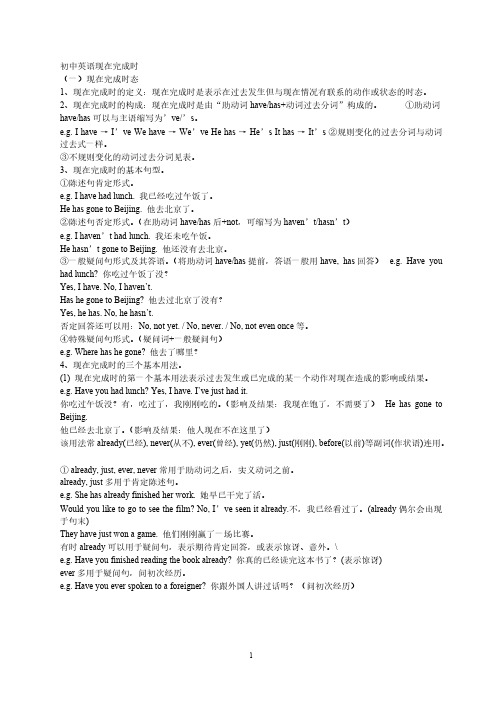
初中英语现在完成时(一)现在完成时态1、现在完成时的定义:现在完成时是表示在过去发生但与现在情况有联系的动作或状态的时态。
2、现在完成时的构成:现在完成时是由“助动词have/has+动词过去分词”构成的。
①助动词have/has可以与主语缩写为’ve/’s。
e.g. I have → I’ve We have → We’ve He has → He’s It has → It’s ②规则变化的过去分词与动词过去式一样。
③不规则变化的动词过去分词见表。
3、现在完成时的基本句型。
①陈述句肯定形式。
e.g. I have had lunch. 我已经吃过午饭了。
He has gone to Beijing. 他去北京了。
②陈述句否定形式。
(在助动词have/has后+not,可缩写为haven’t/hasn’t)e.g. I haven’t had lunch. 我还未吃午饭。
He hasn’t gone to Beijing. 他还没有去北京。
③一般疑问句形式及其答语。
(将助动词have/has提前,答语一般用have, has回答) e.g. Have you had lunch? 你吃过午饭了没?Yes, I have. No, I haven’t.Has he gone to Beijing? 他去过北京了没有?Yes, he has. No, he hasn’t.否定回答还可以用:No, not yet. / No, never. / No, not even once等。
④特殊疑问句形式。
(疑问词+一般疑问句)e.g. Where has he gone? 他去了哪里?4、现在完成时的三个基本用法。
(1) 现在完成时的第一个基本用法表示过去发生或已完成的某一个动作对现在造成的影响或结果。
e.g. Have you had lunch? Yes, I have. I’ve just had it.你吃过午饭没?有,吃过了,我刚刚吃的。
- 1、下载文档前请自行甄别文档内容的完整性,平台不提供额外的编辑、内容补充、找答案等附加服务。
- 2、"仅部分预览"的文档,不可在线预览部分如存在完整性等问题,可反馈申请退款(可完整预览的文档不适用该条件!)。
- 3、如文档侵犯您的权益,请联系客服反馈,我们会尽快为您处理(人工客服工作时间:9:00-18:30)。
Present perfect tense现在完成时Objectives1.学习现在完成时;2.总结现在完成时与一般过去时的区别及用法。
Grammar一、现在完成时的定义:1.表示过去发生或已经完成的动作对现在造成的影响或结果。
2.也可以表示过去已经开始,一直延续到现在的动作或状态二、现在完成时的结构have/has+ done (过去分词)注意:表示短暂时间动作的词,如:come,go,die,marry,buy等的完成时不能与for,since等表示一段时间的词连用。
用来持续的动作或状态或表过去重复的动作,如live,study,be,wait等,常和since(自从)或for(经历)引导的词语连用。
如:I have lived here for more than thirty years.我已在此住了30多年。
三、现在完成时的时间状语1.ever, never, twice(once…), so far(到目前为止), , already(肯定句), yet(否定,疑问句), just(刚刚), before(以前), recently(近来)等词连用2.Since+时间点,for+时间段,in the past/last few years表示短暂时间动作的词,如:come,go,die,marry,buy等的完成时不能与for,since等表示一段时间的词连用。
用来持续的动作或状态或表过去重复的动作,如live,study,be,wait等,常和since(自从)或for(经历)引导的词语连用。
说明:already与yet都有“已经”的意思,但already常用于肯定句,并用于句中。
yet常用于否定句和疑问句,并用于句末。
例如:I have already finished my homework.I haven’t finished my homework yet. Have you finished your homework yet?They have left. (他们已经离开了,也就是说现在他们人不在这里)I have had my lunch. (我已经吃过午饭了,也就是说我现在不饿)I can’t find my watch now. I think I have already lost it.注意:1)现在完成时不能单独与过去的时间状语连用, 如yesterday, last week, three years ago 等;2)不能与when连用四、现在完成时的用法A.表示过去发生或已经完成的动作对现在造成的影响或结果,强调对现在造成的影想或结果)。
e.g. The car has arrived.车子来了。
(结果:车子已在门口)Someone has broken the window.有人把窗户打破了。
(结果:窗户仍破着)B. 表示过去已经开始,持续到现在的动作或状态,可以和表示从过去某一时刻延续到现在(包括“现在”在内)的一段时间的状语连用,如for+时间段、since+过去的时间点、疑问词how long等。
e.g. My uncle has worked at this factory for five years. 我叔叔在这个工厂工作已经五年了。
Mr. Black has lived in China since 2002. 自从2002年Mr. Black 一直住在中国。
How long have you been here? 你来这里多久了?用相应的延续性动词替换短暂性动词,句中谓语动词用现在完成时,时间状语为“for+时间段”或“since+时间点”。
e.g. He has been in the Green China for three years.He has been a member of the Green China for three years. 他加入“绿色中国”已经三年了。
The old man died 4 years ago. =The old man has been dead for 4 years.He joined the Party 2 years ago. =He has been in the Party for 2 years.I bought the book 5 days ago. =I have had the book for 5 days.表示时间段的短语有:for+一段时间(for 2 years), since+从句(since he came here), since+时间点名词( since last year, since 5 days ago),how long; for a long time等。
五、现在完成时态与一般过去时态的区别1.一般过去时表示过去某时发生的动作或单纯叙述过去的事情,强调动作;现在完成时为过去发生的,强调过去的事情对现在的影响,强调的是影响。
I saw this film yesterday.(强调动作发生的时间是yesterday )I have seen this film.(强调对现在的影响,电影的内容已经知道了。
)2.一般过去时和表示过去的时间状语连用,如:…ago, last week/...In 2008, in the past, just now, the day before yesterday, yesterday ...Then(那时),that day, one day, once(从前)3.现在完成时常和recently(近来),ever, never, twice, so far(到目前为止), since,for,inthe past/last few years , already(肯定句), yet(否定,疑问句), just(刚刚), before(以前)连用。
现在完成时不与表示过去的时间状语连用。
现在完成时可表示持续到现在的动作或状态,动词一般是延续性的,如live, teach, learn, work,study, know.六、比较 have/has been to、have/has gone to 和 have been inhave(has) been to...表示“曾去过某地,已经从那里回来了”,可以和ever、never、twice等连用。
have(has) gone to表示“已经去了某地,在去那里的途中或到达那里还没有回来”。
have(has) been in 表示“在某地呆多长时间”,常与表示一段时间的状语连用,如:since, for, how long 等He went to Shanghai last week 上周他去了上海He has been to Shanghai.他(曾经)到/去过上海.(但他人现在肯定不是在上海而是回来了)He has gone to Shanghai.他已经去上海了.(也许刚动身出发,也许已经到了,也许还在路上,反正他人不在这里)Mr. Brown has been in Shanghai for three days.布朗先生来上海已经有三天了Exercises单项选择1. _______ has Mr. White been a member of Greener China since he _______ to China?A. How soon, comesB. How often, gotC. How long, cameD. How far, arrived2. His uncle _______ for more than 9 years.A. has come hereB. has started to workC. has lived thereD. has left the university3.—_______ you _______ your homework yet?—Yes. I _______ it a moment ago.A. Did; do; finishedB.Have ; done ; finishedC.Have ; done ; have finishedD.will ; do ; finish4. His father _______ the Party since 1978.A. joinedB. has joinedC. was inD. has been in5. —Do you know him well?—Sure. We _______ friends since ten years ago.A. wereB. have beenC. have becomeD. have made6. When he arrived at the bus stop, the bus _______ for 20 minutes.A. has leftB. had leftC. has been awayD. had been away7. I _______ the League for 5 years so far.A. joinedB. have joinedC. have been inD.have been8.The factory _______ since the February of 1988.A. has been openB. has openedC. was openD. opened9. Mary and Rose _______ friends since they met in 2000.A. have madeB. have beenC. madeD. have become10.The meeting _______ for a week now.A. has finishedB. has endedC. has been overD. has been finished11.Miss Gao ______ this school for nearly 5 years.A. has been inB. has come toC. has taughtD.has been taught12. How long _______ he _______?A. did, diedB. has, diedC. has, been deadD. did, die13. He _______ at eight yesterday afternoon.A. sleptB. was sleepingC. has sleepD. had slept14.He _______ the car for a week.A. boughtB. has boughtC. has hadD. bought15.--How long can I ______ the book? --Two weeks.A. borrowB. lendC. getD. keepReading完形填空This is the famous Battered-Body Trick (苦肉计) in history. One ____1_____, Zhou Yu was thinking hard in the light about how to beat Cao Cao's army when Huang Gai came in. He suggested attacking with fire. "Well, it's exactly _____2_____ I want to do," said Zhou. "But I need a man totake fire to Cao's camp." Huang said he was _____3_____to do it.The next morning Zhou Yu held a meeting. He ____4____his people to prepare three months'food for the coming battle. Just then Huang said, "Cao has a _____5_____ and stronger army than wedo. So we can't win. Why not _____6_____ this and ask for peace?"Zhou Yu got angry, " My responsibility (职责) is to fight with Cao. Why do you say such words? Come on! Get _____7_____ out and kill him."All the other people begged for Huang. Zhou said at last, "OK, I won't kill you. _____8_____,you'll have to get one hundred army sticks (军棍)!" Huang was badly hurt.Later, Huang sent a letter to Cao and he said that he wanted to help Cao. Before long, Caoreceived another letter from his two men in Zhou's army, saying "Huang is _____9_____."In this way, Huang succeeded in setting fire to Cao's camp. Soon Cao's ships _____10_____ in abig fire because all of them were tied together.1. A. morning B. noon C. afternoon D. night2. A. how B. what C. why D. when3. A. sad B. kind C. happy D. angry4. A. cried B. spoke C. asked D. shouted5. A. more B. longer C. smaller D. larger6. A. keep B. stop C. begin D. finish7. A. you B. me C. him D. them8. A. However B. For example C. By the way D. Because9. A. stupid B. clever C. honest D. terrible10. A. went B. fell C. broke D. burnt阅读理解Friendship can help you stick to your aims and make you more successful, according to an article inTimes.Carlin Flora, the writer, who has studied friendship for years, finds that if you really want tochange something in your life, you can develop friendship with people who have the same aims as you do.Friends can help make your own will stronger. Following good examples can help you get rid of badbehaviors and form new, healthier ones. For example, after a busy and tiring day, you probably want togo home and watch TV. However, your friend knocks on your door and asks you to go jogging with him.After jogging, you talk over coffee together. This is much better than just sitting in the room watchingTV.Flora also points out that it’s best to stop bad habits by turning attention to different, good ones.Instead of staying at home alone and spending hours in front of your computer, building up f riendship with those who have the values and habits you admire will lift you up more easily.We all wish to be with, and be liked by our friends. When you have friendship with people withstrong wills and good behaviors, you will not only succeed more easily, but also find joy on your journey. [来源学&科&网]1. The underlined word “ones” in the third paragraph means _______.A. examplesB. behaviorsC. friendsD. aims2. In the writer’s opinion, _______ is better for you after a busy and tiring day.A. sitting in the room watching TVB. staying at home aloneC. spending hours in front of your computerD. jogging with a friend3. According to the writer, we should make friends with those who _______.A. have the values and habits w e admireB. often go jogging with usC. have the same jobs as we doD. talk over coffee with us4. The main idea of this passage is _______.A. friends can help make your own will strongerB. we all wish to be with, and be liked by our friendsC. it’s best to stop had habits by turning attention to different, good onesD. friendship can help you stick to your aims and make you more successful语法填空Few Chinese people could be 1. ________ (busy) than Senior 3 students these days. With thenational college entrance examination drawing near, they spend every waking hour 2. ________ (battle)with books, pens and test papers.Under such great pressure, more and more students are now 3. ________ (choose) to studyabroad. They want to reduce(减少)their stress 4. ________ develop personal interests.Leaving China to live abroad 5. ________ your own is not easy. Even simple daily talks can maketeenagers 6. ________ (happy) or more homesick. Another concern is that it is very expensive 7.________ (study) abroad.Actually, Chinese education is becoming more open. This year, Fudan University decided to acceptstudents based on their abilities 8. ________ before making a decision, seriously consider whetherit's worth (值得的) spending so 9. ________ (many) to take that challenge. Going to a good Chineseuniversity might be better for you.Studying abroad is a different experience that can make a great change to your life. But, 10.________ you only have blind faith(信念), it may well be a bitter lesson.HomeworkSometimes I really wonder 1. ________ there is love between my parents. Every day they are veryntic ways that I read about in books or Ibusy 2. ________ (make) money. They don’t act in the romasee on TV. 3. ________ their opinion, “I love you” is too much to say.One day, my mother was sewing a quilt. I quietly sat down beside her and looked at her.4. ________ (silent).“Mom, I have a question for you,” I said, breaking the“What?” she asked, still doing her work.“Is there love between you and Dad?” I asked her in a very low voice.She stopped her work and raised her head with surprise in her eyes. But then she continued to sewthe quilt. I was very embarrassed because I thought I had hurt her.It seemed like 5. ________ very long time before my mother started to speak again.said thoughtfully, “look at this thread. Sometimes it appears, but most of it disappears in the quilt. Thethread makes the quilt strong. If life is a quilt, then love should be a thread. It can 6. ________ (hard)be seen anywhere or anytime, but it’s really there. Love is inside.”e (中风)I listened carefully but I didn’t understand before the next spring. My father had a strokand couldn’t walk by 7. ________ (he) any more. After that, my mother helped my father walk outsideevery day. Along the country road, there were many beautiful 8. ________ (tree). They two, hand inhand, walked slowly. To me, that was 9. ________ (beautiful) picture in the world —that’s a picture of love.They still don’t say “I love you” to each other. But I know they have deep love for each other. I used to think love 10. ______ (mean) flowers and sweet kisses. But actually, love is just a thread inthe quilt.。
